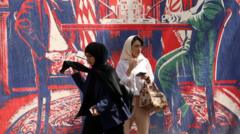Iran continues to escalate its uranium enrichment activities, as indicated in a recent confidential report by the International Atomic Energy Agency (IAEA) that has instigated "serious concern" among the global community. The report, detailed by BBC sources, reveals that Iran has amassed over 400 kilograms of uranium enriched to 60% purity, a purity level approaching weapons grade and significantly above what is deemed necessary for civilian applications. This accumulation represents nearly a 50% increase within three months, suggesting that Iran is capable of producing enough fissile material for about ten nuclear weapons should further refinement occur.
The IAEA's findings come amidst ongoing diplomatic negotiations between Tehran and Washington regarding Iran's nuclear program, which Iran maintains is intended for peaceful purposes. However, the watchdog has expressed uncertainties surrounding the peaceful nature of Iran's nuclear ambitions. IAEA Director General Rafael Grossi conveyed the agency's growing alarm about Iran’s escalated production rate, estimated at roughly one nuclear weapon's worth of material per month over the past quarter.
In light of these developments, allied nations including the United States, United Kingdom, France, and Germany are expected to advocate for the IAEA's board of governors to formally declare Iran in violation of its non-proliferation obligations. Concurrently, Israel has echoed concerns, characterizing Iran as "totally determined" to develop nuclear weapons capabilities, arguing that Iran's level of enrichment serves no civilian purpose and aligns only with military objectives.
The Iranian government, represented by Foreign Minister Abbas Araghchi, has categorically stated its rejection of nuclear weapons. In a recent address, Araghchi asserted Tehran's unacceptability of such armaments, aligning with the West on the fundamental view that nuclear weapons should not exist.
US intelligence suggests that if Iran opts to pursue a nuclear weapon, the timeframe for producing weapons-grade material could be as short as two weeks. The IAEA report, lengthier and more detailed than its typical assessments, further reveals findings regarding Iran's historical nuclear endeavors, including undeclared activities at three previously unknown sites.
As the ongoing negotiations with the US yield limited progress on significant issues—most notably Iran's potential continuation of enrichment under future agreements—international pressure mounts. Recent commentary from close advisors to Supreme Leader Ayatollah Ali Khamenei hints that Iran could reconsider its opposition to developing nuclear weapons in response to increasing external pressures, escalating fears among Western nations regarding Tehran's trajectory toward becoming a 'nuclear threshold state.'
The IAEA's board of governors is anticipated to convene shortly to determine the next course of action, potentially leading to Iran's referral to the UN Security Council amidst calls for greater transparency and compliance with international nuclear non-proliferation norms.




















